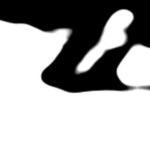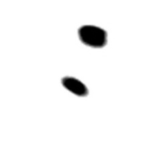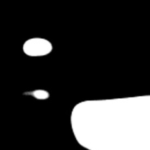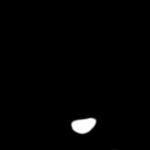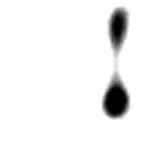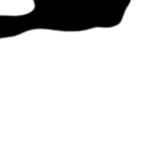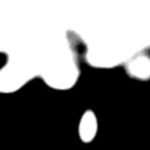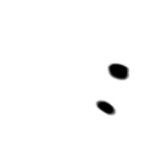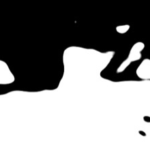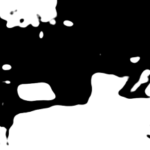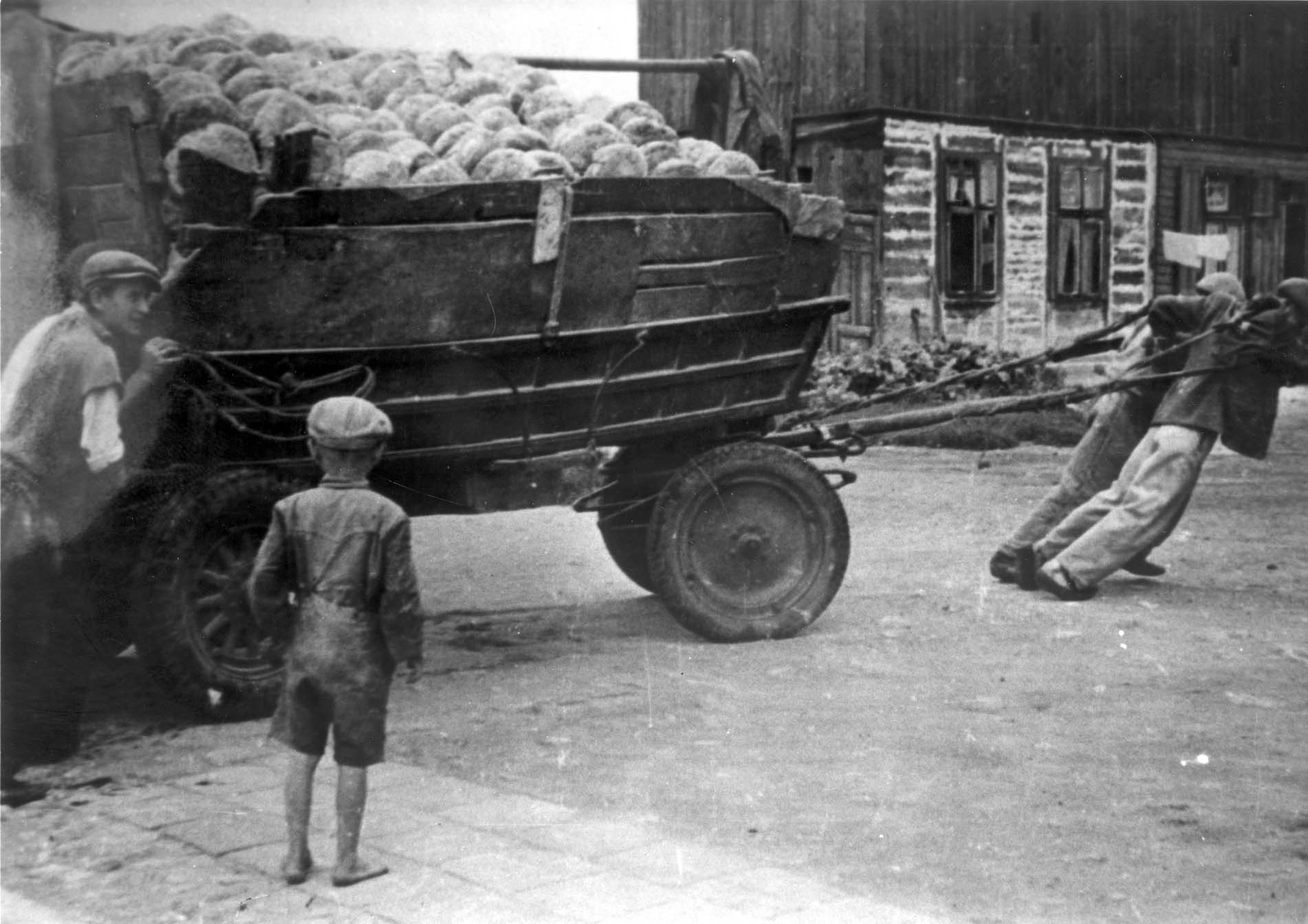Crane Path
Clare Goulet
Transporting bread on a cart, Łódź, Poland
photographed by Mordka Mendel Grossman
Archival Signature: 4062/16
Album Number: FA260/A16
The boy from Łódź slides out of a cream manila envelope found in a hollowed-out wall in 1983, Sal Przweskie on a smoke break puffing a stubby Warta (seven złoty for a pack of twenty, mercifully filtered) while his six-man crew takes apart the Fenner building that once filled this whole block and has, at last, been declared nie nadający się do zamieszkania, unfit for human habitation. Pale spots like wet snow at night blot the lower left-hand corner of a one-inch square of undeveloped film. The boy from Łódź is exactly the length of Sal’s thick, dirty fingertip on which he is balanced and carried, flammable, across the doomed floorboards with immense care. Then: driven across town in a black car, soaked in silver nitrate, pushed about with tongs. Then: pegged to a line of rope hooked on nails in the mediaeval oak beams of a basement darkroom. Timed.
Turned inside-out, the falling snow is a handful of dirt flung up, pretend soup of three-year-old Magda Zuraw on Krzyżowa Street. She crouches out of the frame and only the dirt is caught, midflight, and a flock of cranes rushing north a hundred meters above the stones. From left to right, two children push a wagon with iron wheels, the taller one lifting his face to the sky, each bird as separate from its own cast shadow as Peter Pan’s, snapped off by that dropped window as he escaped and soared out into the night, followed by John, and Michael and Wendy this flurry of black outlines sliding up and over the brick wall as swiftly as their counterparts above: One last glimpse at the window, watching them receding into the sky until they were as small as stars in the next moment the whole flock—real, imagined—gone.
Hung on the Muzeum Sztuki wall with twenty others, the boy from Łódź is the one you see first: his small back like a light coat hanger for a wool jacket a lovely boy clad in skeleton leaves his ears sticking out from a head that seems too large, and what used to be long trousers have been chopped into szorty, badly, with scissors or perhaps a knife. What you see first is the exposed backs of his legs (that bare, tender skin behind the knees), but the most entrancing thing about him was that he had all his first teeth. The boy from Łódź watches a wooden cart roll past him heaped with bread, layer upon layer of pale oblong loaves like blank faces, the two children who haul it leaning so far forward it’s as if they have already fallen. The boy from Łódź is measuring the attention of the boys pulling the cart against the attention of the dogs, the height of the bread in the cart against the length of his own hunger, and decides the distance is too great.
In 1983,as Sal Przweskie is carrying a piece of nitrate film that could burst at any moment into flame (the old projectors that used to ignite, the can of film that once burned for hours underwater), the boy from Łódź is too busy to notice, elsewhere—that looks like him building a fort behind Sunnyside Park Plaza with Greg Plume and Lyle and Miles, the twins. When the boy from Łódź bends over he is a pile of skinny limbs in grey t-shirt and acid-washed jeans, his thin brown hair flipped back, feathered, the smooth plastic handle of a red comb poking bright from a back pocket. The boys are breaking sun-bleached planks in half across a stone, lengthwise, to lean between the chain-link fence and the grassed bank of the Sackville River for a place to hide, smoke cigarettes, play the Smiths, the Cure, the Clash, decide Camaro or Thunderbird, condom or pulling out and where and to whom, and when they turn sixteen—
No. The boy from Łódź has farmed this land for the past forty years. At dusk he walks a path lined with poplars toward a green lake. He has spent the second half of the twentieth century walking between the same two fields in western Poland, a half hour from the rebuilt city. At the end of the day his hands are their own creatures, separate from him, lumped with arthritis, calloused, muscled—they trail in the uncut grasses, fingers spread. The sky over the southern marshes is scribbled with żurawie migrating in loose erratic packs—not the pure white stork of Polish fable but ragged birds draped in bruised shades of gray and blue, their arms of wings flung back like his own, fingers blown apart by wind, feathered. And the noise! (Yet still the favored creature of Hephaestus, fallen god of fire, himself banished and banging away at his assembly line of armor.) Like Smith for blacksmith, Klein for small, their wonky, honking kroooo has named the species: a tube inside each slender, elongated throat keeps coiling deep inside the heavy body, splitting the sternum, letting them blast from Bobrowniki to the Galilee, the one name they were given, Genus Gru, species gru (Notice in the guide the sloped shoulders, the heavy, feathered wingtips) like fingers, spread, the head licked with flame. A single smear of red at the crown, like a wound or blessing, the only remarkable note.
Each year in these fields the żurawie are skittish and first to leave, pulling the whole autumn migration behind them as they head with their babies for France, Spain, Morocco, anywhere but here. The boy from Łódź grown old knows that somewhere just out of earshot, in fields south of Kolo, birds on the ground are calling to their counterparts in the sky; he knows all he hears now is a half-song in fanciful stories people can talk to the birds, freely, and I wish this were such a story, but truth is best, and I want to tell you what really happened. He turns and treads uphill, toward the village road, for potato soup, two pieces of salt haddock in sour cream, a half loaf of rye. Behind him sun flares on the lake, cranes etched on red like a line of blown ink. Turned like that he doesn’t see behind him whole minutes of birds pass, then a last one—comic, hopeless afterthought—flapping to catch up.
The boy from Łódź has a splinter now from splitting planks behind the mall, which was a dumb idea and not his, and now a long shard has slid under the skin at the base of his thumb, almost to his wrist; he can feel with his other hand the straight wood inside him, stick man, marionette. Lyle opens a pocketknife to slice down the length of the splinter to lift it out and the boy from Łódź knows it will hurt a little, said Wendy to Peter Pan, Oh I shant cry and he clenched his teeth and did not; the boy from Łódź knows he has nothing to complain about. Don’t move. Watching the blade open his skin where it is wet and red, he sees for one inexplicable second a cousin gutting fish on the Warta river in a world where there were cousins and rivers and when the knife tip touches the edge of the wood he gasps −
The boy from Łódź is eight years old in 1942, learning to set one brick on top of another until he can no longer see over the wall and an older boy has to take his place, while he stirs, instead, a pail of cement that looks so much like porridge you want to eat it. The boys on the island vary, of course, in numbers according to as they get killed, and so on; and when they seem to be growing up, which is against the rules. In the pocket of his chopped shorts is a pack of cards he has almost finished drawing in the evenings when he sits inside his cupboard and listens to a British children’s story from a French book with colour plate illustrations, one chapter each night passed into Polish by his mother and whispered through the shut door while he crouches inking numbers and royal faces on ripped cigarette boxes picked from the street. He’s old enough to read the posters, the Sperre for every child under ten in a room-to-room search. Tomorrow morning he’ll leap two years, time just one more thing to be traded, his name for a complete pack of cards (the one he is working on now, jack of clubs with a curled Captain Hook moustache and startled eyebrows raised in perpetual surprise).
The boy from Łódź, with his newly bandaged hand and the splinter in his pocket like a badge, stuffs his mouth with marshmallows out of a plastic bag from the Kwik-Stop, halfway home, smoke break, tangle of banana-seat bicycles thrown against the warm brick below the Atlantic Lotto sign and the payphone; in the blurred photo snapped with Lyle’s cheap Instamatic he is laughing harder than anyone. This, said Greg, is some good shit. The boy from Łódź says nothing, pulling warmth inside his lungs to feel the hard, numbing ache, climbing higher and higher until Greg is shaking his arm, Hey. Share but the boy from Łódź just smokes and stares.
Days after the negative was tucked in its envelope and slid behind a cupboard, the boy from Łódź wearing the same chopped pants was, of course, caught in the Allgemeine Gehsperre Aktion, one of six thousand children marched to a cart to a train to a town to a smaller train to a smaller town to a church, to a room for undressing, to a hall, a ramp, a van driven 200 metres with its exhaust pipe fit to a grate in the center of the packed truck, end of story. All the small bodies thrown on the earth were burnt in layers of a hundred, woodchips packed between each layer, bones and ash pounded with wooden mallets into dust bagged in the blankets their mothers had insisted they bring with them; in this way, the ashes are carted all the way to Zawodka Mill and tipped, still warm, into the Warta river.
How the story wants to keep going, sliding over its own farthest edge: how the boy from Łódź slipped out of the pen of trucked children, leapt off the moving train, changed cap and coat, slicked back his black curls with palms full of axle grease and ran into the Rzuchow forest until the Russians came, walked out whistling. By1952 the sea breeze on deck has wiped him so clean he lands weightless in America, unencumbered (which is another word for numb), free to slip through any dragnet, any window of opportunity, as they say here, which means szczęście, which is luck as long as you move too quick to be caught but his shadow had not had time to get out; slam went the window and snapped it off. The boy from Łódź knows that only two lies matter now: To the Bathhouse. To the Doctor. He gets as far as California, never marries, produces nothing but movies, every second one a blockbuster, his success undiminished by the bombs. In the city of angels where nobody ages he soars, legendary for playing the accordion between takes or downing rounds of RobRoys in the Hotel Phoenix slumped on a stool at the bar, where he convinces almost any pretty girl who has run away from home that he has a part for her, how all the best roles in fairytales go to orphans.
Except there was no slick ship, no movie-star ending: the boy from Łódź flew from a DP camp in Warsaw to Illinois in a heavy-bellied American military plane, ID number pinned to his coat, slack canvas knapsack beside him, destined for a job at the Prince Hill post office. He walks depopulated suburban sidewalks, the youngest person delivering mail until they tell him he’s too old to work. After Łódź he never drank or smoked, a card-carrying teetotaler in slacks and sky-blue v-neck sweater, permanently pressed on the Ashburn School Parents Committee, a smiling opener of doors, kneeling for holy communion in Saint Theresa Cathedral in downtown Cincinnati where he has converted for the wife who will be his first, as he will convert back for his second, so that somehow a boy from a family that once believed only in opera and its hat factories ends up in a split-level bungalow in Cincinnati with eight Catholic and nine Hasidic grandchildren; the boy from Łódź has never had so many people praying for him.
(But the boy from Łódź is still striding home between his fields at dusk, walking slowly away from the lake, cranes lifting one by one in a long line from the horizon; he is thinking about his rows of potatoes stacked in layers of sawdust in the northernmost end of the barn. October, almost the end of the century. In the church at the edge of the village a man lifts a piece of bread skyward This is my body which will be
The story Sal Przweskie’s wife tells: how the window of the nursery blew open and a boy did drop on the floor, how the boy from Łódź fell whole out of the wall, how his small white bones dissolved into dust when Sal’s hands caught him, how the dust was like sifted flour on skin, on Sal’s second-best workboots (which had cost her sixty złoty, remember, and four hours in a queue), how it piled like cigarette ash in little heaps on the planked floor that had to be rinsed later, how the boy from Łódź had secreted himself even into the cracks between the boards.
In Cincinnati after Mass the boy from Łódź is asleep in a La-Z-Boy dreaming he is eight years old at his wooden desk in Litzmannstadt writing a mathematics exam he’ll never finish, one bony leg wrapped around the other. At the top in the space for his name he has written a string of numbers, and below that the sums, and each column must add up to the same amount but they don’t and before he can fix it the door splits in two and time runs out—he jolts awake, pointing at a colour television set with his plastic remote, the perfect word with which to disappear. He presses hard with his thumb until he can hear the songs of Palmolive, Polydent, Campbell’s Soup, Cup-a-Soup.
The boy from Łódź saw the black paint that autumn sprayed on the wall of his garage, old right angles for a new century and still he didn’t vote in all that noise. So he was surprised to find himself awake that mild November night of the election, curled in thin blue pyjamas near the radio speaker, as if television had never been invented, his arms wrapped around his knees as if he was back in a Litzmannstadt cupboard. The next day he’ll fly overseas to Munich for the trial; tonight he looks in the mirror before bed …a ona zbiegła na ulicę, szukając swego małego ciała, a tego tam nie było, sea of soft v’s and shushy waves like vowels opening, and closing, and opening, his mother’s bedtime voice reading Przygody Piotrusia Pana through the locked cupboard door when children died he went part of the way with them so that they should not be frightened her voice filling his ears as he looks for himself in the mirror and his ears still, as when he was a boy, jut out on either side, like wings.
He didn’t know they had spent decades looking for him. Now the boy from Łódź is here: grown extremely, miraculously old at the side of the road between Kolo & Chelmno, fingers curled around the plastic handle of a small, hard suitcase, standing exactly where he has asked the taxi from the airport to pull over. Head tipped back, he smells the air like a small animal; he has stepped into a certain quality of light, of sky he suddenly remembers, the thick Rzuchow forest at the farthest edge of sloping fields, this wet air and everywhere the smell of earth. The silent village behind him is etched in profile on the one road: church, steeple, bank, post office like a paper cut-out glued along the slope. The boy from Łódź carries his suitcase cautiously, stepping in flat, hard-soled shoes unsuited to the rutted mud. In the distance, long lines of cranes appear to be the ground opening, the vast northeast horizon lifting in a tangle of dangling legs. It takes him a slow ten minutes to walk to the middle of the field where he finds the plaque that says 180,000 and a laugh breaks from him like a blast, like a bark—as if four hundred thousand people of Łódź, practically a whole city, vanished into this damp air he breathes in shallow gasps. In the photograph slid between folded sweaters in his suitcase, inside a white envelope covered in poctza lotnicza stickers from the Muzeum Sztuki, loaves of bread are piled in a cart that later was used to pull children who became bags of ash in river silt spread across this field where he stands, now, in his flat, pointless shoes, all around him mud pushing out winter rye and wheat.
(But that’s not possible — by November the cranes are gone and the fields are tilled, quiet, the hay stacked in the barn and the sky dark by afternoon)
What if the boy from Łódź never left, growing old in a small flat bought with the rest of his compensation payment and thirty years in the Lada factory, two rooms and a bathroom twenty floors up in the sky in an enormous concrete block that splits whole flocks of birds in two. If his three tiny dogs are named after the vanished streets: Dolna, Zabia, Krzyżowa. If he wants, he can look over the rebuilt city from a single chair at the kitchen table, thick clear plastic laid over yellow cloth, pinned down by a chunky glass ashtray, national radio playing the national orchestra while he smokes Marlboros sent by his cousin in America one after the other until the room is even darker than the sky. From the street below, you can see the boy from Łódź sitting in a single square window at the eastern corner of the building, twenty flights up in the air
Because the boy from Łódź was the last child pulled from the ghetto, he has been called to the trial of the last surviving camp Kommandant of the war, as if they are twinned. Standing in his tight shoes and pressed suit, the mud from the fields wiped off and his suitcase under his seat he speaks into cameras where his image breaks into pieces and reforms somewhere else, while a woman beside him signs, her hands like bird wings that open and shut, his story now just these quick shapes traced in the air. The woman’s brown hair stops at her chin; she has glasses and quiet eyes. Someone holds up a black and white photograph of a boy standing in front of a cart with what look like children where there should be donkeys but all he remembers is the cranes, a huge flock of them rushing overhead, leaving him a speck of time, a window, a second to maybe snatch some bread. How their shadows raced over the wall, how slow he was, how fast they went. When the judge asks him questions, he looks at the woman’s hands for the answers.
Take your time. A uniformed court officer cups his elbow as he steps down but his foot searches for and never finds the floor and when he opens his eyes the ceiling is so blank it could be sky another map showing through, a Never-bird like a piece of floating paper , perhaps this is a dream. Perhaps this never happened. When they pull a soft cotton blanket up over his body he is relieved they stop at his neck.
Six minutes: the time it takes for metal doors to seal shut on a van that bumps across empty, muddy fields until the doors open again near the edge of the woods At once the lost boys—but where are they?—He, Litzmannstadt’s best escape artist, he who had learned too early to smoke and swear (on the street he used to let the words out of his mouth like dark little birds, and now, curled in a corner of the van, he rides on the backs of their chopped syllables to fly out of himself) —they are no longer there. The boy from Łódź is no stooge; he won’t be stuck here like the others, the ones forever waiting in the photograph on Krzyżowa Street, women in their print dresses and stubborn legs pushed into shoes, held by the cobbles, arms reaching, plaintive, calling to the sky. Pan i pani Darling i Nana wpadli do przedszkola zbyt późno—too late. The birds had flown. Look! he is already above them, sly, naked, he’d be almost cherubic if he weren’t so thin, if it weren’t for the lit cigarette held casually aloft as he rises over the cart of bread and the photographer, over the wall and the penned crowds and the potato fields and the distant Rzuchow forest and the Baltic Sea. Look! he’s rising faster now above their sad hands, the sea of waving faces, lifting swiftly higher, his skinny legs in their chopped shorts streaming behind him like kite strings, the crowd still waving as he rises until you can see only the soles of his bare feet, then: just the red lit tip of his cigarette, then: nothing, a speck in the sky that might be a bird, might be a blue wreath of smoke.
 Clare Goulet is an editor and writer in Nova Scotia, Canada. She has edited poetry for Brick Books and Gaspereau Press and fiction for The Fiddlehead (under Don McKay) and has published essays on metaphor, poetry, and lyric scholarship as well as fiction, poetry, radio documentaries, and text-music collaborations. She co-edited Lyric Ecology (2010) on the work of Jan Zwicky, and contributed to The Arts of Robert Bringhurst (2015). She teaches writing and editing at Mount Saint Vincent University in Halifax.
Clare Goulet is an editor and writer in Nova Scotia, Canada. She has edited poetry for Brick Books and Gaspereau Press and fiction for The Fiddlehead (under Don McKay) and has published essays on metaphor, poetry, and lyric scholarship as well as fiction, poetry, radio documentaries, and text-music collaborations. She co-edited Lyric Ecology (2010) on the work of Jan Zwicky, and contributed to The Arts of Robert Bringhurst (2015). She teaches writing and editing at Mount Saint Vincent University in Halifax.
Notes
1. Krzyżowa street, meaning ‘cross’ street, was a short street that ran between Łagiewnicka and Żurawia streets in the Łódź ghetto in World War Two (the latter street renamed during Nazi occupation Kranichweg, both names meaning ‘crane way’ or ‘crane path’).
2. Lines from J.M. Barrie’s novel Peter Pan& Wendy (1911) are taken from the original text, with two in Polish translation.
3. The Nazi’s Allgemeine Gehsperre Aktion took place in the Litzmannstadt Ghetto in Łódź from September 5 – 13, 1942. During these dates, the locked ghetto was under curfew and no food was permitted to be brought in while the SS deported all children under the age of ten to Chelmno death camp, hunting any hidden children in house-to-house searches, killing people who resisted. At least 6,000 children were taken and killed in those nine days.
4. Motivated by the photograph Transporting bread on a cart, Lodz, Poland (credit: Yad Vashem), photographed by Mordka Mendel Grossman, Yad Vashem Digital Collections; Thanks to visual artist Miya Turnbull for help with re-rendering abstract digital fragments of this photo.
5. Remembering Joszika Klein, 1938-1944. For Sageev, and all Oores.



